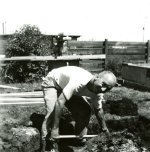
As it turned out, it was the time spent as a convalescent in this city of the"deep South," rather than his participation in the island-hopping campaigns, that provided the crucial life experience. For it was here that he got to know America's hateful side: urban poverty, the misuse of economic power, and, above all, the racism of American society. Together with a fellow officer, he joined the NAACP and participated in the fight for civil rights in this city, contributing actively to the voter registration campaign among the black population. Making not the divisions of this land, which he had gone to war for and never stopped loving, was his experience with direct threats of violence, against which not even his bemedalled officer's uniform could protect him.
While he was still on active duty, he turned to the University of Wisconsin in Madison, there to inquire about the possibilities for graduate study in history at this famous alma mater of the Midwest - known even before Frederick Jackson Turner as an excellent place to pursue the social sciences and history. Williams was admitted, in spite of the fact that his formal training had been relatively sparse. During his time as a doctoral candidate in Madison, 1946 to 1950, he worked under Fred Harvey Harrington. He was also stimulated by fellow students such as John Higham, Jackson Turner Main, David Shannon, Harvey Goldberg, and Wayne Cole and further challenged by the teaching of William Best Hesseltine, Paul Knaplund, Merrill Jensen, Merle Curti, Howard K. Beale, and the sociologist Hans Gerth. It was here that he assembled the knowledge and insights that in the years ahead would make him for the historians of the next, the Vietnam generation, their most influential and revered scholar.
Table of Contents
- On Academic Discourse and the Search for Truth
- Father of the Revisionist School
- The Open Door at Home
- A World Power Against its Will
- Transferring the Frontier Overseas
- An Unheard-Of Provocation
- From Corpus Christi to Madison
- Williams the Teacher
- Unexpected Icons
- Into the Mainstream, Briefly
- A Farewell Song


